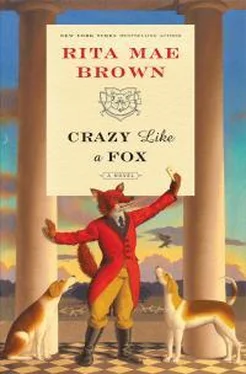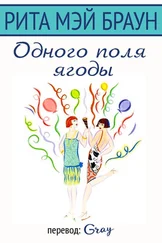“That it is.” It flashed in Sister’s mind that perhaps old bones would be found again. She kept this to herself.
“The pack’s doing so well.” Tedi beamed. “You know the day we elected you Master of the Hunt was a good day and what, over forty years ago?”
Sister groaned. “I’ve lost count but thank you.”
“Foxglove.” Edward named the place they would hunt tomorrow. “Aren’t you glad you don’t need to print up a fixture card for cubbing?”
“Am.” She put down her cup. “Just gives me fits. You never know what’s going to happen with weather, with a landowner. Well, there isn’t a Master in the United States or Canada that doesn’t deal with this.”
“England, Australia, New Zealand, and are they still hunting in Scotland?” Tedi inquired.
“I should know and I don’t. What’s so funny is that banning hunting in England now means more people are hunting than ever before. Can you imagine Congress in the middle of the Iraq War spending so much time on foxhunting? It just makes one wonder, especially as I have always looked up to England.”
“Let’s not congratulate ourselves.” Tedi laughed. “I’m sure we can descend into irresponsibility and silliness as easily as Parliament. We pick different issues, or better yet, we make them up to cover the real issues.”
“Tedi, you cynic.” Sister laughed.
“Old age.” Tedi laughed back.
The Bancrofts had about ten years on Sister, Edward being a bit older than his wife. Perhaps there’s a point at which one has seen it all.
Driving home, Sister called Ben Sidell from her cellphone.
“Master.”
“Sheriff. Are you going to hunt tomorrow?”
“Wouldn’t miss it.”
“Good. Give me a few minutes after the hunt. I have a favor to ask.”
“Anything.”
When Sister got home she parked, walked to the kennels, and opened the door to the office where Shaker was pouring over pedigree papers.
“Studious.”
“Trying.”
“Well, we do need to think about breeding. It looks as though we have a good number of hounds but, as you know, if you don’t keep up you soon lose out.”
He nodded, for any hunt loses about ten percent of its hounds a year. Usually this wasn’t due to death but to older fellows needing to be retired, and a few hounds that would be drafted to another hunt—especially if that hunt needed some of Jefferson Hunt’s bloodlines, which had remained, for more than a century, well-defined, well-documented, and proven in the field. This was no easy task. Then again, a hound might become injured, pull a ligament, and its hunting days were over; usually, the hound would be claimed by a hunt member, where the lucky girl or boy flopped on the couch in the house.
“Mind if I sit across from you?”
“No.”
The club, when it refurbished the kennel back in the seventies, had created a large storage room for past documents, photograph albums, even filing correspondence, some going back to 1887.
Flicking on the lights, Sister scanned the shelves, pulling down a leather-bound book, an expense the club still fielded. Each year’s hound list was documented, a pedigree per page, photographs of each hound and perhaps a comment or two concerning each. Each year also contained hunt staff photos. Some prior masters kept meticulous hunting diaries, also filed. Sister did not do that, much as she admired the practice. She just didn’t have time, plus she never felt she was a good writer, wouldn’t properly describe the hunts. So far she hadn’t been able to bribe anyone to do it for her, although some members maintained their own diaries.
Walking the shelves, the years embossed on the spines of the dark green Moroccan leather, shining in gold, she pulled out 1954 and joined Shaker.
She pored over the pedigrees, the notes written by Wesley Carruthers in a fine, masculine script, in black ink. People cared about such things then, and a man’s hand was usually different from a lady’s, hers having more flourishes; often she used a finer pen nib.
“H-m-m.”
“H-m-m, what?” Shaker smiled at her as he noticed it was an old book, although he didn’t know the year.
“The writing changes after February.” She read some more. “Now it’s Ralph Franklin, Bobby’s grandfather.”
“Did he hunt the hounds? I never heard that.”
“No. He was the first whipper-in. Maybe Weevil was training him.” Sister looked up at Shaker. “Not a bad idea to have more than one person who can keep records.”
“And then Weevil vanished?”
“1954. Anyway, I’ll check with Ben Sidell tomorrow and ask him to allow me to look at the county records. A date of disappearance has to have been recorded.”
“Boss, sounds like a good story.”
“I think it might be but it doesn’t have an end. He was never found. I’m just checking to see if he kept good records, which he did.” She read more, flipped more pages. “The only criticism I can level at Weevil, as he was known, is that he was a little loose about naming hounds.”
“How so?”
“Well, most hunts use the first initial of the mother to name the children. So we have Dasher, Dreamboat, and Dragon out of Delia, the father being Middleburg Why. He has named some of these hounds willy-nilly. Let’s say the mother was”—she looked down—“Rachel. The puppies are Roger, Regina, Christine. See what I mean?”
“H-m-m. Odd.”
Sister had before her a clue, but she didn’t know it.
CHAPTER 12
The Sunday twilight finally gave way to darkness by eight-thirty. Athena, the great horned owl, over two-feet tall with a four-foot wingspread, wings folded, would have dozed off except for Bitsy’s gossip. The screech owl, all of eight-and-a-half-inches tall, should have been named Town Crier. Her wingspan, at twenty inches, suited her little body. This unlikely friendship had begun when both were owlets born in Pattypan Forge, the large abandoned forge at After All Farm. This well-built foundry, first stone laid in 1792, served generations of After All’s owners. People came from all over central Virginia to have iron things fabricated. The foundry fell into disuse in the 1920s as cheap axles, wagon rims, and small hooks were being made elsewhere, some even out of the country. Steel had become easily available and it was lighter than iron. Those war-torn nations after World War I produced many things cheaper later, too.
The building, interior intact, but old windows broken, had served as lodging for many creatures, Athena and Bitsy being just two. Once mature, both owls had left the forge to establish their own nests. Athena borrowed that of a great blue heron near Roughneck Farm. Bitsy made a wonderful nest up in the rafters of the stable at Sister’s farm. Neighbors and friends, they would often cruise over the pastures together, the screech owl flapping many times to Athena’s one great swoosh. She kept up, though.
Tonight, stars bright, they sat in the apple orchard.
Comet left Tootie’s cabin to begin hunting.
“Maybe we should follow him. He’ll push out mice,” Bitsy suggested.
“In time. No hurry. I’m not hungry.” She turned her majestic head. “You?”
“No. Tootie left part of a ham sandwich on the tack trunk in the aisle. I pulled out the ham. I really like ham.”
Athena chortled. “Well, you’ll have to kill pigs to get it.”
Bitsy didn’t reply as a figure quietly approached, almost creeping down the worn path to Hangman’s Ridge. Athena followed Bitsy’s gaze.
Both birds of prey observed while remaining immobile.
The human, unknown to them, reached the apple orchard, going no farther. Whoever he was, the light shining in Tootie’s cabin, as well as those in Shaker’s little clapboard house, stopped him. He studied them. He was smart enough not to get too close to the kennels as he would have set off the hounds, many lounging outside on this lovely night. The temperature, just dipping to the high 50s, felt wonderful to the hounds, as it did to the owls.
Читать дальше












